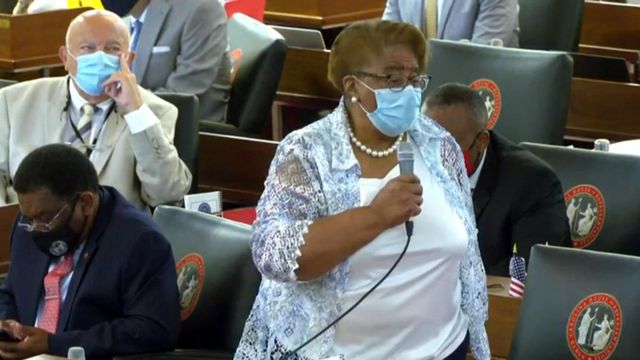Legislature passes bill limiting how NC teaches on race, racism, but a veto looms
Governor's office says the bill "is only meant for the next political campaign," Republicans don't have numbers to overturn a veto.
Posted — UpdatedA veto is almost assured, and Republicans don't have the numbers to overturn it.
“Instead of pushing calculated, conspiracy-laden politics into public education, lawmakers should be focused on supporting teachers, helping students recover lost learning and investing in our public schools," Gov. Roy Cooper spokesman Jordan Monaghan said in an email. "This legislation does none of that and is only meant for the next political campaign."
House Bill 324 has been a priority for Republican leaders in the legislature, who say fringe concepts on race and racism are seeping into the state's education system. They worry white students will be taught to feel shame for the sins of their ancestors or that people are either oppressors or the oppressed. The bill is part of a backlash around the country toward a loose, and often misdescribed, set of ideas in "critical race theory," and bills like this have popped up in a number of states.
North Carolina's language is less restrictive than measures in a number of other states, and GOP House members urged their colleagues Wednesday to focus on the text in a debate where subtext has often dominated.
“To be clear, this bill does not change what history can and cannot be taught," Rep. John Torbett, R-Gaston and a bill sponsor, said on the House floor. "No spin or innuendo changes that."
On its face, the bill forbids discrimination, and Torbett said it pushes back against "any ideology that treats people as inferior.” No one, he said, "should ever be made to feel inferior solely because of their skin or their gender."
"North Carolina must have an education system that unites children, not divides them," he said.
But Black Democrats in particular spoke against the bill, as did the General Assembly's only Native American. They said it looks over teachers' shoulders and warns them against broaching uncomfortable, but crucial, subjects – both in the curriculum and in conversations that might come up day to day.
The bill is also vague on key points, Democrats said. It doesn't say who decides when a teacher crosses the line, nor what the punishment is. Rep. Kandie Smith, D-Pitt, called the measure, “dangerous, insulting and open-ended."
Rep. Brandon Lofton. D-Mecklenburg, said the bill sounds innocuous enough, but it "encourages us to look away from our history, to look away from the truth."
"It goes against my culture," said Rep. Charles Graham, D-Robeson and a member of the Lumbee Tribe. "It goes against our history.”
“I cannot stand here today and allow my heritage and my history to be further erased," Graham said. "This bill is based on fear-mongering, but it is the communities like mine that will pay the price. The true history will never be known.”
The bill doesn't forbid topics, nor does it ban books. It says educators can't "promote" 13 listed concepts, and it defines "promote" as "compelling students, teachers, administrators, or other school employees to affirm or profess belief in the concepts described." It doesn't say how complaints should be lodged.
Among those concepts:
- That one race or sex is inherently superior to another
- That an individual, solely by virtue of his or her race or sex, is inherently racist
- That an individual's moral character is determined by his or her race or sex
- That anyone "should feel discomfort, guilt, anguish, or any other form of psychological distress" solely because of his or her race or sex
- That a meritocracy is inherently racist or sexist
- That the United States was created by people of a particular race or sex "for the purpose of oppressing members of another race or sex"
- That the rule of law doesn't exist, but "instead is a series of power relationships and struggles among racial or other groups"
Opponents said everyone agrees: Students shouldn't be forced to believe these things. Who would even teach them, Rep. Abe Jones, D-Wake, asked the House chamber, other than a white supremacist?
“It’s a boogeyman," Jones said, adding that, if anyone does teach like that, they can be handled locally.
“So what’s the purpose of this bill?" Jones asked. "The purpose of this bill, I believe, reading through the lines, is that somebody up in here wants to control what’s going on in a county where they don’t come from.”
The bill also requires schools to post notice online at least 30 days before teaching subjects laid out in the bill. The same rule applies for teacher training, something supporters have pointed to as a precursor to controversial theories entering the curriculum.
But this section, and the bill in general, have an out. The rules don't apply to speech protected by the First Amendment or to the "impartial" discussion controversial aspects of history or "the historical oppression of a particular group of people based on race, ethnicity, class, nationality, religion, or geographic region."
Lofton recounted his family's history under slavery and the oppression that followed in Virginia and then questioned how anyone could be impartial about it.
"Impartial," he said. "The word impartial meaning neutral, detached and disinterested."
House Republicans largely stayed quiet during debate Wednesday, except for Torbett and Rep. Destin Hall, R-Caldwell, who chairs the key House Rules committee.
Both argued that the bill simply doesn't attack the things critics say it does. Hall said the bill speaks to "the very essence of the civil rights movement,” that we don't treat people different based on their race.
"The language of the bill makes it very clear that teachers can't compel students to do certain things, to believe certain things, not that they can't teach about racism," Hall said.
Related Topics
• Credits
Copyright 2024 by Capitol Broadcasting Company. All rights reserved. This material may not be published, broadcast, rewritten or redistributed.






